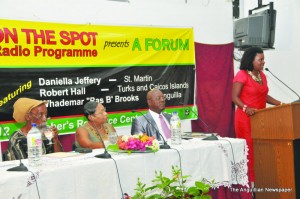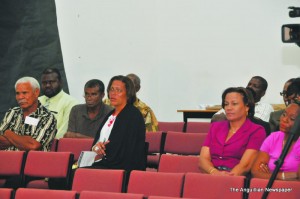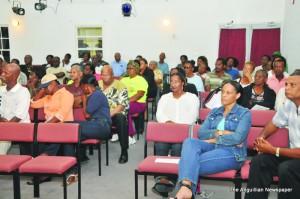
The Teachers’ Resource Centre was the venue for what has been described as a well-attended and successful “On the Spot” Forum which was held on Thursday, February 23, in celebration of Black History Month. The forum was organised mainly organised by Patrick Hanley (DJ Sheriff) and Mrs. Josephine Gumbs-Connor, cohosts of the interactive “On the Spot” radio programme.
It had as its theme: “With the increasing domination ofBritainand its European Union Partners in the affairs of its Territories, will Black People in our Territories be free or still in chains?”

The presenters were Ms. Daniella Jeffry, an Educator, Researcher and former President/Founder of the United Saint Martin Movement; Robert Hall, a former Deputy Chief Minister in the Turks and Caicos Islands where he is currently a businessman and hosts the radio talk show “Expressions”; and Whaldama Brooks (Ras B), a Language Teacher at the Albena Lake-Hodge Comprehensive School and Journalist at Up Beat Radio.
Mr. Hall, who has been toAnguillaon a speaking engagement before, spoke in detail on the political and administrative situation in his territory which is now being administered by the British Government. His presentation was of much interest to the audience given Anguilla’s status as one the TCI’s sisterOverseasTerritories.

“When I was here last, I spoke of the Commission of Inquiry which resulted in the suspension of the Constitution and, since that, we have had several arrests of former Ministers and trials are pending,” he reported. “The former Premier, Michael Missick (who lives in theDominican Republic), has not been served as yet. Whether he will return to face the music, I don’t know. But what I can say is [that] while we have to acknowledge that serious mistakes were made, and in many cases it is fair to say they may have run foul of what should have been the norm in governance, the British were always in charge through their Governor.
“He [Missick] was never summonsed to the Commission of Inquiry; he hasn’t come back to the islands since; there are no charges over anything affecting him. I am not for one moment absolving former Ministers of wrong for after all we elected them not any British Governor…This is where the double standard and hypocrisy of Britain comes into play, because it is like one thing for locally-elected officials, but their Governors are protected…and treated as if they are different; and many of the deals, particularly the land dealsthat they now question, their Governor signed off on them.”
Other comments made by Mr. Hall included the handling of budgets ofOverseasTerritoriesby the British Government, and the question of elections in the Turks and Caicos. “Is it fair that they should insist that small territories balance their budgets when the British budget is billions indebt? Again, you see the doubled standards,” he opined.
“Many ask, when will there be elections in the Turks and Caicos. I cannot say. But one thing I can tell you is that the tide in Turks and Caicos is changing…and we are going to hold those British feet to the fire in this year, 2012. It’s time for the people in theTurks and Caicos Islandsto have their own Government. If democracy means government by the people, for the people, then send back that power to the people.”
The presentation by Ms. Jeffry, the St. Martin spokesperson, was also of much interest, as one ofAnguilla’s neighbouring territories, notwithstanding its French nationality and governance.
Ms. Jeffry spoke about the vagaries of colonialism in French St. Martin where, she said, the indigenous people were virtually a deprived population in terms of land and business. She stressed that the people there were being considerably marginalised, and apportioned blame onFrance, the mother country.
She was of the view that St. Martin and all of the British and otherOverseasTerritorieswere experiencing similar difficulties, and she therefore called for an awareness of the situation among the people of the various territories.
Ras B also made colonialism the focal point of his presentation. He described colonisation as a system that “is vicious in thought and inflicts mental and physical abuse on the colonised.”He charged that colonialism had the effect of making colonised people incapable of thinking in a subjective way about their own interest.
He acknowledged that partnerships for progress and prosperity had been verbally imposed, but said they were terribly lacking in action. He added that the liberalisation of a colonised people would only come by education.
Commenting on the forum, Mrs. Josephine Gumbs-Connor stated: “First of all, I think it was very well-attended. I believe that the message from both Mr. Hall and Ms. Jeffry highlighted, very strongly, that all our islands are going through a form of colonisation that we have to be conscious of as a people. [This is because] it is clashing directly with us on a cultural level, particularly, and on a level that is at odds with how we seem to wish to be developed as a people.
“For me, and I think in general, from what I am hearing in terms of the response, is that it was an awakening about the direction that our territories seem to be taking. In addition to the direct relationship that we have with our respective mother territories (in the case of St. Martin, France, and TCI and Anguilla the UK), we have an additional burden with respect to the European Union…As the people who populate these territories, it highlights that we have to consider where we are going, and whether the path that is being set for us is the path that we want to take.”







